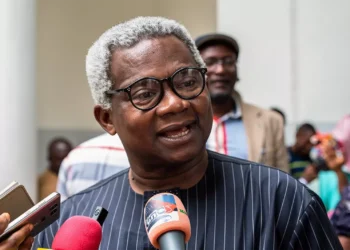Kalu Aja, a well-known financial analyst and educator, recently shared his perspective on Nigeria’s economic situation and the impact of recent policy changes under President Bola Tinubu. According to Aja, Nigeria was on the brink of financial collapse and would have been completely bankrupt if President Tinubu had not taken decisive actions such as floating the naira and removing fuel subsidies.
Aja explained that floating the naira and eliminating subsidies on Premium Motor Spirit (PMS) were not merely policy options but essential steps due to Nigeria’s severe economic constraints. He emphasized that these actions were necessary to prevent an even worse economic crisis.

Without these measures, Aja suggested that Nigeria would have faced a situation where basic necessities, like bread, would only be available through government-issued vouchers, indicating a complete financial breakdown.
In a detailed post on his X account, Aja also expressed concerns about the implementation of supportive measures, or “palliatives,” intended to cushion the impact of these economic reforms on the average citizen. He criticized the government’s approach, pointing out that the proposed N8,000 palliative was an inadequate response.
According to Aja, the government took a full year to recognize the urgent need for food imports and to develop a plan to address this issue. During this period, the promised Compressed Natural Gas (CNG) buses, which were intended to offer an alternative public transportation option, have not yet become available.

Aja’s critique highlights a broader issue with the implementation of economic reforms. He argues that if President Tinubu had taken more proactive measures, such as eliminating all duties and taxes on food and swiftly introducing effective public transportation alternatives, the economic adjustments would have been less painful for Nigerian citizens. This approach, Aja believes, would have alleviated some of the immediate hardships caused by the policy changes.
Furthermore, Aja emphasized the unsustainability of the previous subsidy regime. He pointed out that the government spent more on PMS subsidies than on critical sectors like health, education, and infrastructure combined over the years. This excessive spending on subsidies was not a sustainable strategy, and the reforms were necessary to redirect funds toward more productive uses that could benefit the nation in the long term.
Aja’s comments provide a critical view of Nigeria’s economic policy decisions. While he acknowledges the necessity of floating the naira and removing fuel subsidies, he underscores the importance of effective implementation of supportive measures to ease the transition for citizens.




































